- Home
- Diana Killian
Docketful of Poesy Page 7
Docketful of Poesy Read online
Page 7
“I know what you’re going to say, Robbie. I don’t need to hear it right now.” He turned to me. “Hey there, Grace. Roberta gave me the good news last night.”
I must have looked blank because he said, “About you agreeing to join our project. The news about Walter was a shock, of course.”
“And this is Peter Fox,” Roberta said shortly.
“The man, in the flesh,” Miles said cheerfully, shaking hands with Peter. “What do you think of our fair city?”
“Smog, traffic, concrete buildings: its charms are nearly irresistible.” Peter was smiling, but there was no question he meant what he said. True, he had only seen a few of the charms the city had to offer, but if it had crossed my mind that we might spend part of any future together in the States, I gave the idea up then.
“Hey,” Miles began. “We’ll get together one night and —”
“Miles!” called Pammy. “Places, people! Time is money. Miles, we need you on the set now.” The plump, red-haired assistant director moved off, listening intently to one of the technicians.
Miles excused himself. Peter indicated he would stay to watch the filming, and with a dark look I followed Roberta, who was gesturing a little impatiently. “Of course it’s a tragedy about Walter. So young, so talented.” Roberta sounded like she was reading from a script. And not a very good one. The speech was clearly for the benefit of the rest of the cast and crew. “It must have been horrible for you.”
More horrible for Walter, I thought. I said mildly, “It was pretty awful.”
“And they didn’t find the driver?” The cat’s-eye glasses turned my way.
“Not that we’ve heard. And I suppose we would have because we’d have to testify at any trial.”
Roberta hesitated, and then asked, “Do you think there’s any possibility that it wasn’t an accident?”
I stared at her. “Why would you suggest that?”
Roberta appeared to be fascinated by the filming going on across the long-echoing room. “Well, murder does seem to follow you, doesn’t it? Walter was a pain in the ass, but I can’t see anyone finding him so annoying they decided to kill him.”
“Well, people may find me annoying, too, but hopefully no one’s decided to kill me.”
“I wasn’t thinking of you so much as him.” Roberta indicated Peter with a nod of her head.
For a moment we both observed him—and observed Tracy muffing her lines and giggling his way. I said, “Peter’s trip was on impulse. I don’t see how anyone could have known he was here.”
Still not looking at me, Roberta smiled. “I notice you don’t argue that someone might want to kill him.”
“He’s made enemies.”
“Haven’t we all?” Roberta did face me then. She smiled. “But some enemies are more dangerous than others.”
*****
Peter and I were booked to fly out Sunday. I was packing my books Saturday night when my mother stopped by my bedroom.
“Hi,” I said, zipping up my suitcase. “I’m just about finished.”
She sat down on the foot of the bed and picked up my copy of Feldman’s British Women Poets of the Romantic Era, idly flipping through it.
This was the room I had grown up in: walls of the palest pink, the ornate black iron bed I had slept in since high school, violet-sprigged drapes and fluffy white duvet. I had grown up loved and sheltered in this house. My parents had provided every comfort, advantage, and protection they could afford.
I looked at my mother’s bent head in the gentle lamplight. There were glints of silver in the red I’d never noticed before. Seeing them gave me an odd feeling.
“I remember when you went away to college,” she said suddenly, looking up and meeting my eyes.
I sat down on the bed next to her. “I remember too. You came to my room the night before I left and told me that if it wasn’t what I wanted—if I wasn’t happy—I could always come home.”
“Yes.” She smiled wryly, set aside the Feldman, and picked up the silk-bound copy of L.E.L.: A Mystery of the Thirties. She smoothed the cover with an absent hand. “But there was really no question that you were making a wise choice and that you would be happy. And you have been very happy—and very successful.”
“You and Dad gave us the confidence to…make the right choices.”
She nodded. “Are you sure you’re making the right choice now?”
Was I? There were never any guarantees when it came to the future, and of course I had qualms about leaving my family, friends—homeland. But I had no doubt that this was what I wanted to do. Didn’t that count?
“Yes,” I said. “I am.” And I reached to hug her. She hugged me back—hard.
When she released me, there were tears in her eyes.
“I’m glad,” she said. Her gaze held mine as she handed me the copy of Laetitia Landon’s biography. “But if you decide this isn’t what you want—that Peter is not the man you think he is—don’t be afraid to admit you’ve made a mistake.”
Chapter Seven
Lulled by the summer breeze, among the drowsy trees...
Ann Radcliffe’s “To the River Dove” drifted into my thoughts as I watched the swans in the river below glide silently beneath the arch of the stone bridge where I waited for Peter on Monday morning.
The Nora Roberts of her day, the author of The Mysteries of Udolpho and The Romance of the Forest is chiefly important—and best known—for her influence on the Gothic romance. Jane Austen’s Northanger Abbey was a parody of Radcliffe’s work. But she was also a travel writer and a poet.
Unfortunately for my purposes, Radcliffe had lived and worked in almost total seclusion. She was well educated, conservative, married, and apparently quite happy to avoid the limelight. At the height of her fame and popularity, she inherited a fortune from her father and abandoned writing—much to the lurid speculation of her public, who preferred to believe the writer’s tales of Gothic horror had unhinged her own mind.
Oh stream beloved by those with fancy who repose…
Nothing had changed, I thought with something like relief, watching the lazy blue water glittering in the shifting afternoon sunlight. Innisdale still looked like the illustration in a children’s story—or perhaps a very expensive coffee table book. The white cottages with their dark slate roofs, flowerboxes blazing with flowers, elegantly untidy gardens lining the narrow streets. Gentle chimes tolled the eleventh hour from the church down the lane.
It seemed a million miles from Los Angeles—geographically and spiritually—but I knew from personal experience that murder lurked in the most unlikely places—and hearts.
Before leaving Los Angeles I’d called LAPD to see whether there was any new information on Walter Christie’s death—and to make sure there was no problem with my leaving the country. The detective in charge of the case said that the Datsun 280ZX involved in the accident had been found abandoned several streets away. The car had been stolen from a used car lot on the other side of town; the prevailing theory was that the car had been stolen by joyriding punks, and that Walter had simply been in the wrong place at the wrong time.
The detective hadn’t had a problem with me and Peter leaving the country, provided we were prepared to return to testify or provide depositions if and when needed. He seemed doubtful that the need would ever arise.
And that was that.
Movement at the other end of the bridge caught my eye, and I turned to watch Peter’s approach. He strode along, long-legged and unconsciously graceful, his expression preoccupied, and I wondered how his meeting with Chief Constable Heron had gone.
I yawned. The flicker of light on water and the honeyed warmth of March’s variable sunshine made me sleepy despite faithfully popping Airborne and No-Jet-Lag tablets on the long, long flight from Los Angeles; I’d been fantasizing about bed and breakfast—in that order—since we’d landed at Heathrow many hours earlier. Peter had been intent on getting home, and I, to my surprise, had felt much the same.
It was the first time we’d really traveled any great distance together, and I’d found it an eye-opener. For one thing it was the first time I had ever flown first class.
“How did it go?” I asked, as Peter reached me.
“As you’d expect.”
I tucked a limp strand of hair behind my ear. “Well, that’s cryptic.”
“Your would-be swain DI Drummond seems to feel that any attempts on my life are the result of my misspent youth—and probably well deserved.”
“He didn’t really say that.”
Peter’s mouth tugged into a smile. “Oh, but he did. Very direct, your Brian. No beating about the bush. No tactful hints, no time wasted on diplomacy —”
“He’s not ‘my’ Brian,” I felt obliged to point out.
“No, but he wishes he were.” Putting his arm around me, Peter dropped a light kiss on the bridge of my nose. “You look very peaceful standing here watching the river.”
“I’m half-asleep. Do they have any leads? Any ideas about who the shooters were?”
“It didn’t sound like it.”
“But didn’t the witnesses in your shop see anything?”
“It’s difficult to notice details when guns are going off around you.”
I quoted Kipling’s “If”. “‘If you can keep your head when all about you are losing theirs…’”
“You probably don’t fully understand the situation,” Peter concluded dryly, and I laughed.
We walked the short distance back to Peter’s Land Rover and headed through the woods to Craddock House. Peter was silent during the drive, and I wondered exactly what had been said in his meeting with the police.
The woods were still somber despite the first daffodils. The bronze tints of the dead bracken and yellowed moss hinted at the coming warmth of spring and summer, but the winter grass was still deep and the blue shadows were long across the lane as we sped in and out of sunlight.
When Craddock House at last appeared before us I was reminded of the first time I had seen it —and for a moment it looked untouched. It was still the most beautiful house I’d ever seen: dormant vines and a few budding flowers stark against whitewashed walls and silver slate roof. Weathered brick chimneys stood sharp against the clouds, diamond-shaped windowpanes glinting in the fitful sunlight.
It did indeed seem as if I were coming home. But as we pulled up outside I noticed the ground floor windows boarded up, and the crime scene tape.
I followed Peter up the flagstone walk, waiting while he unlocked the door, watching him disarm the security system. My gaze kept straying to the bullet holes pockmarking the walls, the broken pottery, the knocked-over furniture. I could easily imagine the panic, the terror of those few moments when the gunmen had burst in and started shooting.
“Who reset the alarm system?” I asked, talking myself away from the mental image.
“Mrs. Mac.”
Mrs. Mac was Peter’s charwoman. She wasn’t exactly my idea of a reliable employee, but she did seem manically devoted to Peter and his interests. But then he was the kind of man who inspired mania in all kinds of people. For all kinds of reasons.
“You really don’t have any idea —?”
He said, suddenly angry, “No. I’ve no bloody idea why someone wants me dead. D’you think if I did, I wouldn’t have dealt with it by now?”
What did that mean? It sounded a little ominous. I didn’t have a chance to comment—assuming I had a suitable comment—because Peter looked up at the ship’s figurehead hanging from the tall vaulted ceiling.
“Goddamn it.”
I stared at the splintered hole blown in the mahogany mermaid’s midriff.
“Oh, no…”
He strode through the aisles of furniture, taking swift inventory of the damage. I followed more slowly, wincing at the destruction. Some of it had been done by the gunmen, some of it had probably occurred when Peter’s customers had scrambled for safety, and some of it had probably happened during the subsequent police investigation. Peter was not popular with the local law.
The door to the stockroom was blown open, and I shuddered looking at it. It was obvious that Peter had escaped with only moments to spare.
“It’s a miracle that no one was hurt.”
“Yes.”
He met my eyes. “Bullhead Drummond is right about one thing. It’s probably not a good idea for you to stay at Craddock House ’til this is sorted out.” He looked away.
I stared at his profile. “What does that mean?”
He gestured to the ruined door and the wreckage beyond.
“If you don’t have a higher opinion of my courage than that —”
“Grace —” He bit off what he started to say. Instead, he said quietly, “This has nothing to do with your courage or my opinions.”
“I see.”
“No, you don’t. Not if your tone is anything to go by.” He was smiling one of those practiced smiles, clearly hoping to avoid a quarrel, and I took sour pleasure in not responding. He sighed. “I know what you’re thinking, and you’re wrong. This isn’t me wriggling out of anything. Drummond’s right. Whoever shot up Rogue’s Gallery might try again.”
“So you don’t want me to work here either?”
“It’s not a matter of what I want. They hit the shop in broad daylight. I can’t guarantee that it mightn’t happen again—and I don’t want you in the line of fire.”
He was making perfect sense; I knew that. I did. If only I didn’t have the uneasy feeling that perhaps he was glad to delay our moving in together. I had wondered at how calmly he seemed to face the prospect of giving up his bachelor’s idyll.
I said shortly, “Great. But according to you the police haven’t made any progress with their inquiries?”
“No. That seems to lie at my door as well. Had I been here to personally tell them I have no idea about why someone would want to kill me, it might have made all the difference.”
It wasn’t funny; it was awful, but I had to hide a smile at Peter’s acerbic words.
“Apparently no one saw anything—beyond the fact that the two masked men disappeared in the woods.”
My eyes moved to the blasted door, and I shivered. He put his arm around me, drawing me close.
“What’s the plan then?” I asked muffled against him. “We just keep our distance until…what? They try again or they don’t try again? And if they don’t try again, how long will it take for you to decide that they aren’t trying again? Are we supposed to wait weeks? Months? Years?”
“It’s not like you won’t have plenty to keep you busy,” Peter said bracingly. “You’ll be working on this film—working on your next book—you wouldn’t have time to help out at the shop anyway.”
I pulled away and stared at him. “I’m not actually worried about keeping myself occupied. I thought the idea was, we were going to…well, make a go of it.”
“Live together you mean?”
“Well, yes.”
“We are.”
“We are? Together but separately?”
“It’s not for long.” He wasn’t meeting my eyes. “I’m going to make a few inquiries of my own.”
“Great.” I moved away to the bow window that looked out over the banks of rosebushes and hedges to the velvety lawn beyond. “You know, if you don’t want to—if you’re not ready —”
“Grace.” He pulled me back against his side and dropped a quick kiss on the top of my head. “I’m trying to do the right thing.”
“I hate it when you try to do the right thing.”
Peter laughed. “Lucky for you then, it doesn’t happen often.” He let me go, moving towards the door. “Let’s see if we can get you a room at the inn where your posh movie star friends are staying.”
“Gee. That sounds like fun. A slumber party with the Hollyweirdos. Have they already started arriving?”
“Oh yes.” There was a wealth of unsaid commentary in those two words.
I could jus
t imagine local opinion. I gestured to the havoc around us. “You don’t want my help cleaning this mess up?”
“You’re exhausted, love; and frankly, so am I. I’m not touching anything tonight.”
Apparently that included me. Was this any way for a famed roué to behave? Apparently it was. He moved to the front door, holding it wide, and I followed him out into the overcast afternoon.
*****
Innisdale had three inns. At my insistence we started with the least expensive one only to learn it was booked up with crew members of the Kismet Production Company. No room at the next inn either.
That left the Hound and Harrier, a three-hundred-year-old former coaching inn locally renowned for its six highly prized en suites, cozy restaurant, lovely mountain views, and beer garden.
“I can’t afford to stay here.” Even as I protested I was trying to calculate whether being foisted on Peter against his will was really the move I wanted to make.
His brows arched. “What an appallingly mercenary wench you are.”
“It’s easy to take a lofty view when you’re not worried about your finances.”
“There’s nothing for you to worry about. Naturally I’ll pay.”
I stopped mid-step and Peter reached out to keep the door from swinging back on me. “Why would you pay?”
“Must we have this conversation?” He sounded truly pained. He nodded for me to continue inside, but I balked.
“Yes, I think we must.” I gestured vaguely at the glimpse of gleaming wooden floors, stained glass windows, and watercolor paintings before us. “I can’t just…allow you to…pick up my tab.” That blank, blue stare was having the most ridiculous effect on me. I knew I was in the right, yet I felt gauche, rude for pointing out what was surely obvious.
“I thought we were going to ‘make a go of it’?”
“Well, we are.” I was annoyed to have my own words thrown back at me.

 High Rhymes and Misdemeanors
High Rhymes and Misdemeanors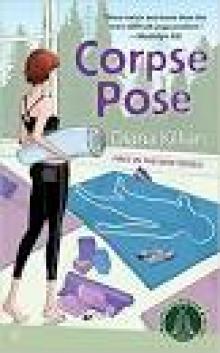 Corpse Pose
Corpse Pose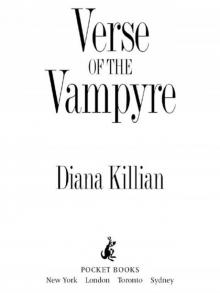 Verse of the Vampyre
Verse of the Vampyre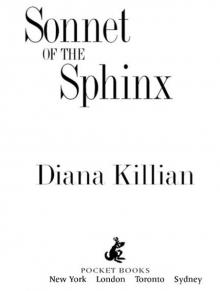 Sonnet of the Sphinx
Sonnet of the Sphinx Docketful of Poesy
Docketful of Poesy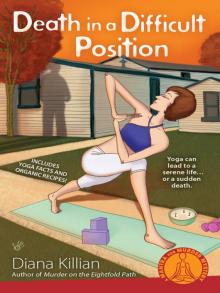 Death in a Difficult Position
Death in a Difficult Position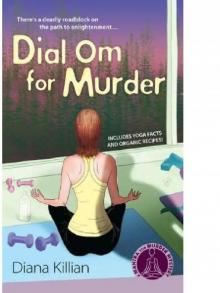 Dial Om for Murder
Dial Om for Murder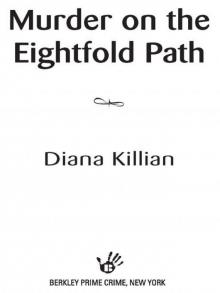 Murder on the Eightfold Path
Murder on the Eightfold Path